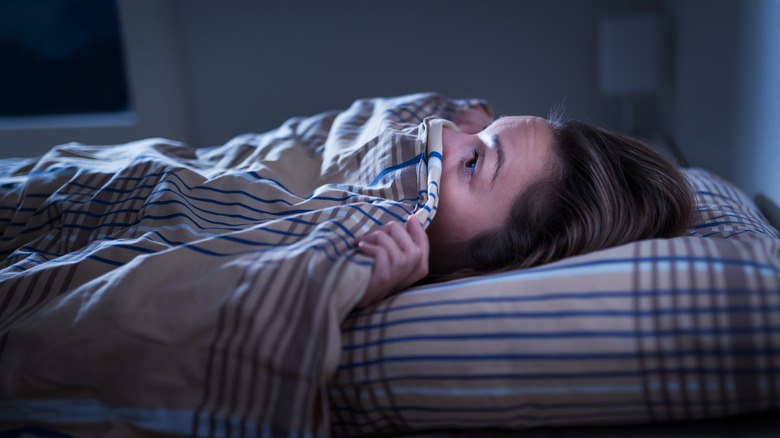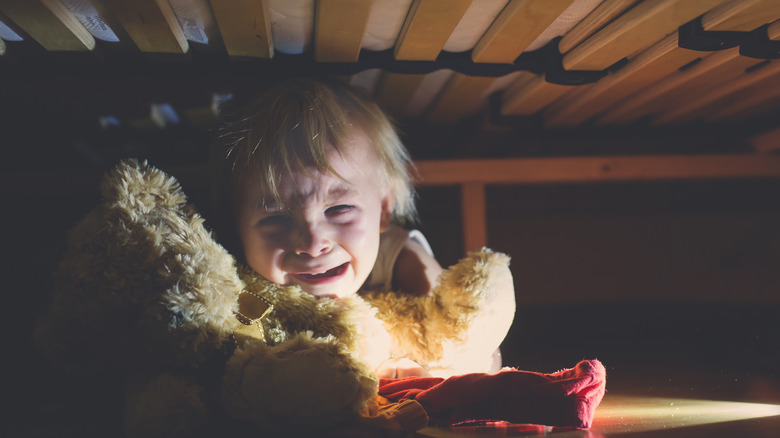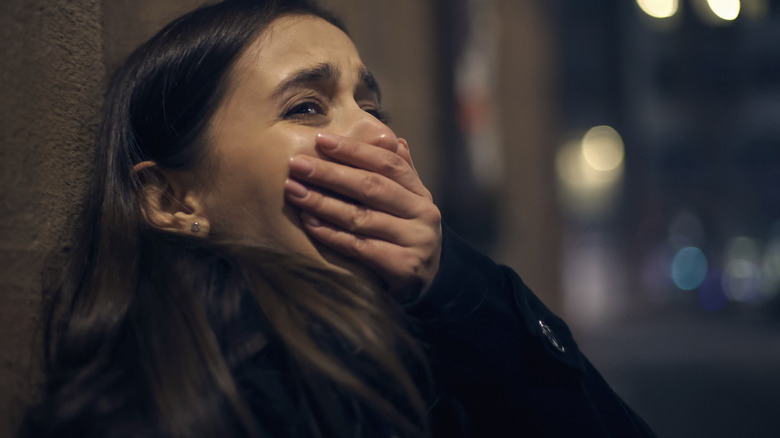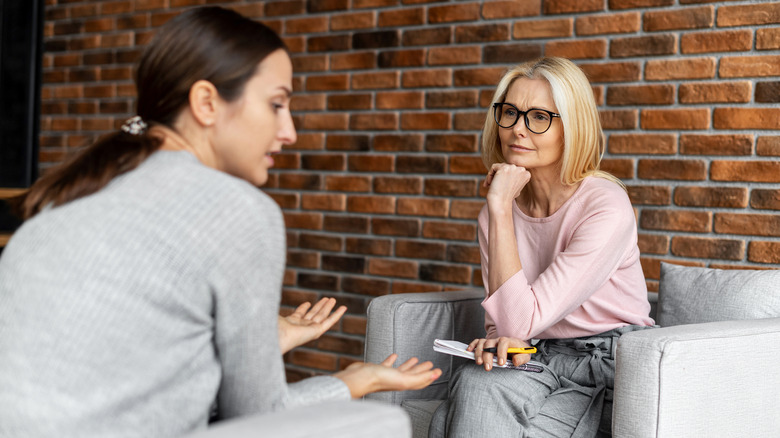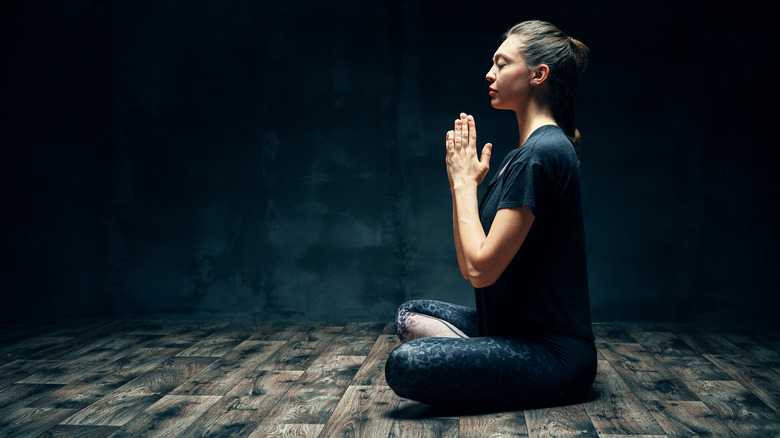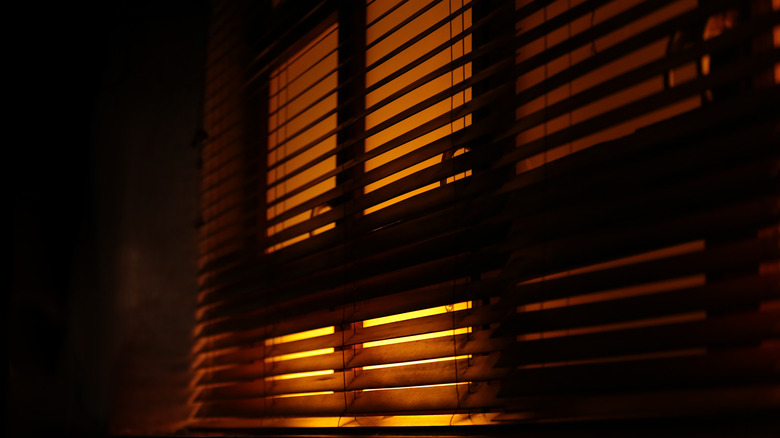The Real Reason You're Afraid Of The Dark
Humans are afraid of lots of things. Some fears are rational, while others are not. When you are plagued by an irrational and uncontrollable fear of something, it is called a phobia (via Johns Hopkins Medicine). As many as 19 million Americans experience some kind of phobia, with symptoms ranging from mild to severe. One common phobia is a fear of the dark. If you suffer from this fear, you are not alone. Glamour magazine reports that 11% of the U.S. population is afraid of the dark. Some might argue that it is somewhat normal to be afraid of the dark because, after all, it is difficult to see — so you can't tell what's around you, or what threats might be lurking out of view. However, an extreme fear of the dark is called nyctophobia, and like with many phobias, some cases are so severe that they can disrupt daily life (via Healthline).
What causes a fear of the dark?
Some experts believe that a fear of the dark is evolutionary, going back millennia. Psychologist Simon Rego told Glamour that cavemen most likely feared the threat of being hunted in the dark, which is perfectly valid. Aside from inheriting a certain amount of anxiety from our ancestors, personal circumstances can also cause a person to be afraid of the dark. For instance, children who witness adults showing fear of the dark may develop a fear the dark as well (via Healthline). Traumatic events can also contribute to phobias, as can genetic factors. Another cause might be that when we cannot see well, our other senses are elevated, putting us on high alert (via Medical News Today). So if you hear or sense something in the dark and do not know what it is, you most likely will experience a slight bit of anxiety or fear.
Symptoms of nyctophobia
As with most phobias, symptoms of nyctophobia can vary from person to person. That being said, most people who are afraid of the dark tend to become anxious when they find themselves in dark places (via VeryWell Health). While a little nervousness is more normal, and people with a severe phobia may have an outsized response such as a panic or anxiety attack (via Medical News Today). Typical symptoms of nyctophobia include sweaty palms, dizziness, labored breathing, or a rapid heart rate. Some people may feel queasy or experience cold or hot flashes. People with severe nyctophobia may go to extremes to avoid going out at night or being in a dark place. They might also need to sleep with a nightlight on to alleviate their fear. Other symptoms include feeling powerless, crazy, or extreme panic. Some people experience heightened anxiety prior to entering a room or other area that is dark (via VeryWell Health).
Cognitive behavioral therapy for nyctophobia
Treating nyctophobia can be difficult, as there is no specific medication recommended for it. But some psychological treatment is possible. PsyhcToday noted that cognitive behavioral therapy (CBT) is a common treatment that can help people manage their phobias. The publication noted that CBT is actually quite effective and beneficial. During sessions, patients talk about their fears, which could lead to understanding their source. Knowing where these fears come from can lead to looking at them in a more healthy light, ultimately reducing high levels of anxiety. Furthermore, with ongoing therapy, patients can begin to realize how irrational their fears are, which also helps them cope with panic attacks. There are several types of CBT, including individual and group therapy. Another method is dialectical behavioral therapy, which focuses on emotional reactions to thoughts and behaviors. Rational emotive behavior therapy helps patients to identify and question their irrational beliefs, which leads to healthier thoughts.
Treating nyctophobia with mindfulness therapy
Mindfulness is another promising treatment method, because it allows you to enter into a calm state of mind in just about any situation (via PsychToday). There are several techniques to help achieve a peaceful state, ranging from breathing techniques to apps that help redirect thoughts. Meditation is often successful because it takes the mind away from fear and brings it to focus on things in the present moment, such as breathing, different sounds and smells in the room, or other sensations such as heat or cold. According to PsychToday, focusing on the breath is quite helpful when attempting to calm anxiety. In the same vein, yoga is a form of meditation that helps calm the mind and the breath. As you focus on your movements, your mind is pulled away from any stressful thoughts. Along with learning to cope with stress, yoga helps you build strength and flexibility.
Exposure therapy for nyctophobia
Exposure therapy is just what it sounds like. Patients are exposed to their fears in a safe and controlled environment in an effort to desensitize them (per American Psychological Association). In nyctophobia cases, patients would be exposed to dark places in a non-threatening environment. For patients with nyctophobia, exposure therapy can work, but only with a skillful practitioner. If a patient is subjected to too much darkness too soon, it could have the reverse effect, exacerbating the fear (via PsychToday). Similarly, if patients are not exposed to enough darkness to help alleviate fears, then treatment might not be successful.
Fear is a normal part of life, and being afraid of the dark is considered normal in children (via Healthline). However, adults with nyctophobia might find that it is debilitating and keeps them from living life to the fullest. When any fear prevents you from living normally, it is never too late to seek help from a professional.

